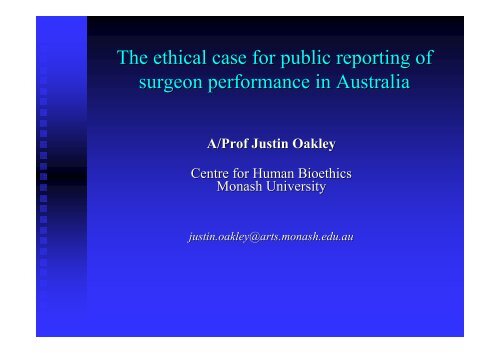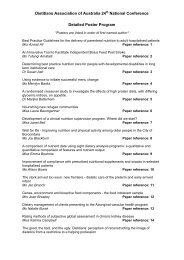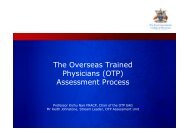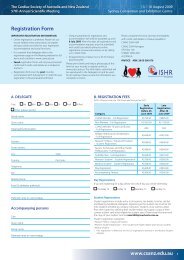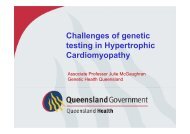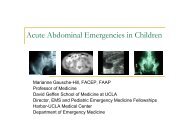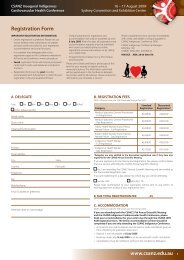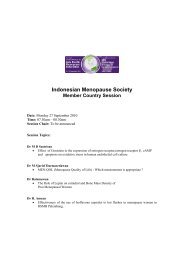Download Presentation
Download Presentation
Download Presentation
Create successful ePaper yourself
Turn your PDF publications into a flip-book with our unique Google optimized e-Paper software.
The ethical case for public reporting of<br />
surgeon performance in Australia<br />
A/Prof Justin Oakley<br />
Centre for Human Bioethics<br />
Monash University<br />
justin.oakley@arts.monash.edu.au
Recent developments in public reporting of<br />
hospital and surgeon performance information<br />
• Hospital ‘report cards’ for many procedures have been available for some time<br />
in the US, UK, and Australia. In the UK, see Dr Foster website:<br />
http://www.drfosterhealth.co.uk/<br />
• Cardiac surgeon-specific performance data (‘surgeon report cards’) have been<br />
publicly available in several US states (eg New York, Pennsylvania) since the<br />
early 1990s. In 2001 New York also began publishing cardiologists’ mortality<br />
rates for angioplasties. See:<br />
http://www.health.state.ny.us/diseases/cardiovascular/heart_disease/docs/2004-2006_adult_<br />
cardiac_surgery.pdf<br />
• Since April 2006, the UK Healthcare Commission (now the Care Quality<br />
Commission) has published a website (jointly developed with the SCTS)<br />
showing risk-adjusted surgeon-specific survival rates for CABG and aortic<br />
valve replacements, for UK cardiac surgeons. See:<br />
http://heartsurgery.cqc.org.uk/information-for-patients.aspx<br />
The Commission envisages broadening this to other surgical specialties in the future.
Ethical arguments for surgeon report cards:<br />
1. The quality of care argument<br />
Surgeon report cards improve the overall quality of patient care. . This is the argument<br />
studied most in the health care literature.<br />
A number of US studies have demonstrated that cardiac surgery mortality rates decreased<br />
significantly after the introduction of surgeon report cards, and d these rates have been<br />
consistently lower than those in states without surgeon report cards. c<br />
eg:<br />
Peterson et al (1998) conducted a comprehensive study of outcomes of CABG surgery<br />
performed between 1987-1992 on 39,396 patients aged 65 and older in New York State, where<br />
cardiac surgeon report cards were introduced in 1991. They found that outcomes of this surgery<br />
improved significantly over this period, and that “mortality following bypass surgery has declined<br />
significantly faster in NY as compared with the rest of the nation” ( p. 999).<br />
A subsequent study of the outcomes of coronary artery bypass surgery carried out between<br />
1994-1998 on 132,828 Medicare beneficiaries in states with surgeon report cards found that report<br />
cards are associated with lower risk-adjusted mortality rates for such surgery (Hannan et al 2003).<br />
A recent systematic review (Fung et al 2008) of many US studies on the impact of report cards<br />
on the quality of patient care “found additional support for the conclusion that public reporting<br />
stimulates hospital quality improvement activity (p. 121).<br />
Similar results have recently emerged from UK studies. eg:<br />
The 2009 report by the Society for Cardiothoracic Surgery in Great Britain and Ireland found “compelling<br />
evidence” that the quality of care for patients has improved since the introduction of surgeon report cards, and that<br />
CABG mortality rates have fallen by 21% during this period (Keogh et al. 2009).<br />
This reinforced the findings of an earlier study of high-risk patients undergoing cardiac surgery in North-West<br />
England (Bridgewater et al 2007).
Ethical arguments for surgeon report cards:<br />
1. The quality of care argument<br />
There is clearly an association between surgeon report cards and improvements in<br />
the quality of surgical care, though there are a variety of mechanisms for which<br />
there exists some empirical support. There is evidence to support t the following<br />
mechanisms:<br />
<br />
<br />
<br />
<br />
<br />
<br />
Underperforming surgeons become more strongly motivated to improve their<br />
skills<br />
Hospitals restrict the operating privileges of surgeons with consistently poor<br />
performance<br />
Hospitals use surgeon report cards as tools to help identify problems with their<br />
surgical procedures<br />
Patients are less likely to choose surgeons with poorer outcomes<br />
Surgeons become more risk-averse and so turn away some high-risk patients they<br />
would previously have operated on<br />
Conversely, surgeons become more risk-taking, operating on some high-risk<br />
patients they would previously have been reluctant to take on
The defensive surgery objection<br />
While there is anecdotal evidence that some surgeons have become more riskaverse<br />
after the introduction of report cards, there is little systematic evidence to<br />
support claims of the existence of such reactions on a widespread basis. Indeed, a<br />
number of large-scale empirical studies suggest that, if anything, the reverse<br />
seems to be the case. eg:<br />
Peterson et. al’s (1998) comprehensive study of outmigration from New York for<br />
1987-92 found that there was no increase in outmigration for coronary artery surgery<br />
from New York State to neighbouring states without report cards during this period<br />
(Peterson et al. 1998).<br />
Bridgewater et al. (2007) found a significant increase in the number and proportion<br />
of high-risk patients undergoing cardiac surgery in Northwest England between 1997<br />
and 2005, and concluded that “the introduction of public accountability has not led to<br />
a decrease in the number of high-risk patients coming for coronary artery surgery”(p.<br />
747).<br />
A subsequent UK study also found that there has been an increase in the proportion<br />
of elderly patients undergoing cardiac surgery between 1994-2008. (Keogh et al<br />
2009).<br />
One possibility, therefore, is that the surgeons who may have become more risk-averse since<br />
the introduction of report cards are those surgeons who are less proficient at performing such<br />
surgery in the first place. In that case, it could well be to the advantage of high-risk patients<br />
if such surgeons were avoiding them, where this increases the likelihood that such patients<br />
will be operated on by a surgeon who is more proficient at the procedure in question (see<br />
Oakley 2007a).
Ethical arguments for surgeon report cards:<br />
2. Professional accountability<br />
By publishing such information, the surgical profession helps<br />
fulfil a duty it has to be accountable to the community. The<br />
surgical profession is typically granted a monopoly on<br />
provision of surgical procedures in particular countries, and it<br />
is plausible to think that in exchange for this monopoly<br />
control, the surgical profession has a reciprocal obligation to<br />
demonstrate to the community that its services are of an<br />
acceptable standard.
Ethical arguments for surgeon report cards:<br />
3. Informed consent and patient autonomy<br />
Surgeon report cards enable patients to make more informed decisions about<br />
surgery. Patients are entitled to be told about risks of surgery which are material to<br />
them, and one’s risks of surgery in a given case depend in part upon which<br />
surgeon is performing the operation. So, the provision of surgeon performance<br />
information to patients who see this as material to their decision about surgery<br />
seems already required by widely-accepted conceptions of the ethical doctrine of<br />
informed consent (see Clarke & Oakley 2004).<br />
This informed consent argument for surgeon report cards does not rely on report<br />
cards improving the quality of patient care.<br />
Some argue that insurance companies make more use of this data than patients do<br />
see the US experience). Further research will help determine the extent to which<br />
patients make use of this data (Burger, Schill & Goodman 2007; Henderson &<br />
Henderson 2007). But in any case, the ethical arguments for report cards are not about<br />
‘perfecting the market’.<br />
Patients are entitled to surgeon performance data even where they do not have<br />
choice of surgeon. Compare lacking choice of medication. Autonomy as choice vs.<br />
autonomy as authorisation (Oakley 2007b).
Issues for Australia<br />
• Increased health care transparency is an unstoppable international force, and<br />
Australia is now catching up.<br />
• Should we be publishing for patient safety, professional accountability, or<br />
patient choice/understanding?<br />
• Any policy initiative for public reporting of individual surgeon data must be<br />
supported by a political commitment to adequate funding.<br />
• The need for proactive policy rather than reactive policy.<br />
• Surgical associations must be actively involved in developing data standards<br />
and processes for data collection, validation, analysis and publication. It is<br />
particularly important not to create incentives for better-performed surgeons to<br />
act in more risk-averse ways, and so surgeons need to have confidence in the<br />
risk-adjustment process used in processing the data on raw mortality rates.<br />
<br />
Sir Bruce Keogh helped to pioneer the development of the surgeon report cards in<br />
the UK, and while President of the Society for Cardiothoracic Surgery in Great<br />
Britain and Ireland, he spent a substantial amount of time demonstrating the<br />
rigorousness of the proposed risk-adjustment process to his colleagues, some of<br />
whom had considerable misgivings about this.
References<br />
Bridgewater, B, Grayson, A. D. Brooks, N., Grotte, G. Fabri, B. M, Au, J. Hooper, T., Jones, M., and Keogh, B. 2007, ‘Has the<br />
publication of cardiac surgery outcome data been associated with changes in practice in northwest England?: an analysis of<br />
25730 patients undergoing CABG surgery under 30 surgeons over eight years’, Heart, vol. 93, pp. 744-8.<br />
I. Burger, K. Schill & S. Goodman, “Disclosure of individual surgeon’s performance rates during informed consent: Ethical and<br />
epistemological considerations”, Annals of Surgery 245, no. 4, April 2007, pp. 507-13.<br />
Chassin, M.R. 2002, ‘Achieving and sustaining improved quality: Lessons from New York State and cardiac surgery’, Health Affairs,<br />
vol. 21, pp. 40-51<br />
Clarke, S., and Oakley, J., 2004, ‘Informed Consent and Surgeons’ Performance’, Journal of Medicine and Philosophy 29, no. 1,<br />
February, pp. 11-35.<br />
Clarke, S. and Oakley, J. (eds.), 2007, Informed Consent and Clinician Accountability: The ethics of report cards on surgeon<br />
performance, Cambridge, Cambridge University Press.<br />
Fung C.H., Lim Y-W., Mattke S., Damberg C., Shekelle P.G. 2008, ‘Systematic review: The evidence that publishing patient care<br />
performance data improves quality of care’, Annals of Internal Medicine, vol. 148, no. 2, pp. 111-23<br />
Hannan, E.L., Vaughn Sarrazin, M.S., Doran, D.R. and Rosenthal, G.E. 2003, ‘Provider profiling and quality improvement efforts in<br />
coronary artery bypass graft surgery: the effect on short-term mortality among Medicare beneficiaries’, Medical Care, vol. 41,<br />
no. 10, pp. 1164-72.<br />
Henderson, Alan, 2009, ‘Surgical report cards: The myth and the reality’, Monash Bioethics Review 28, no. 3, September.<br />
Henderson, A.J. and Henderson, S.T., 2007, ‘Provision of a surgeon’s performance data for people considering elective surgery<br />
(Protocol)’, The Cochrane Library, no. 1, 2007. http://www.thecochranelibrary.com<br />
Keogh, B., Bridgewater, B., Kinsman, R., and Walton, P. 2009, The Sixth National Adult Cardiac Surgical Database: Demonstrating<br />
Quality, London, Dendrite Clinical Systems.<br />
Oakley, J. 2007a, ‘An ethical analysis of the defensive surgery objection to individual surgeons report cards’ in Informed Consent and<br />
Clinician Accountability: the Ethics of Report Cards on Surgeon Performance, eds S. Clarke and J. Oakley, Cambridge<br />
University Press, Cambridge, pp. 243-54.<br />
Oakley, J. 2007b, ‘Patients and disclosure of surgical risk’ in Principles of Health Care Ethics (2nd ed), eds R. Ashcroft, A. Dawson,<br />
H. Draper & J. McMillan, John Wiley, London, pp. 319-24.<br />
Oakley, J. 2009, ‘Surgeon report cards, clinical realities, and the quality of patient care’, Monash Bioethics Review 28, no. 3,<br />
September.<br />
Oakley, J. and Clarke, S., 2009, ‘Surgeon Report Cards’, in Judith Healy and Paul Dugdale (eds.), Patient Safety first: Responsive<br />
regulation in health care, Sydney, Allen & Unwin.<br />
Peterson, E. D., De Long, E. R., Jollis, J. G., Muhlbaier, L. H. and Mark, D. B. 1998, ‘The effects of New York’s bypass surgery<br />
provider profiling on access to care and patient outcomes in the elderly’, Journal of the American College of Cardiology, vol. 32,<br />
no. 4, pp. 993-9.


